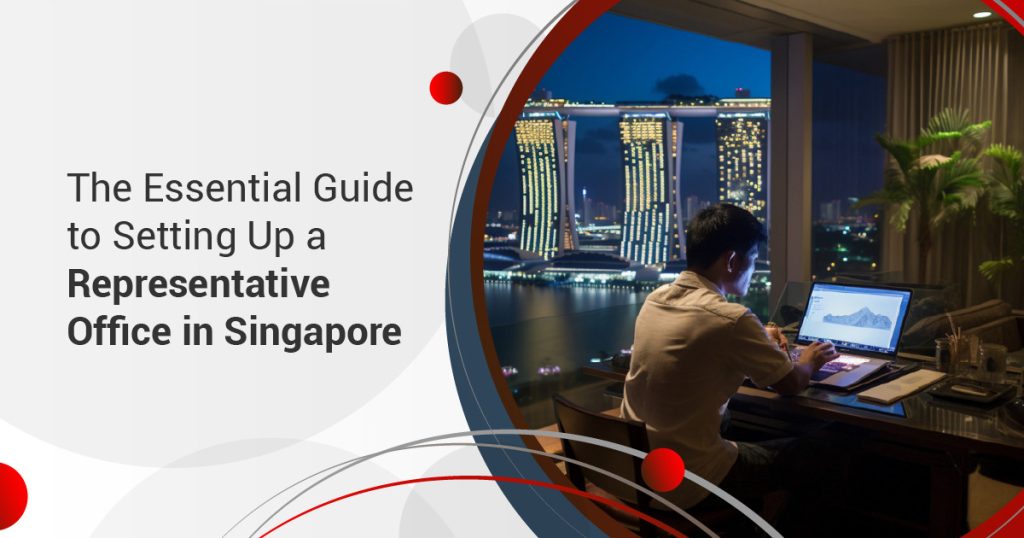Exploring the market potential is essential before you plan the expansion and set up a representative office (RO) in Singapore. This office will be your stepping stone. It will build your business presence in the Singapore marketplace, allowing you to understand local dynamics without sales interaction.
In this article, we will guide you through the process of registering with Enterprise Singapore, making you aware of the functions of a representative office in Singapore and how it can create more business opportunities for you in Asia.
Key Takeaways
- A Representative Office (RO) in Singapore is a non-commercial entity that enables foreign companies to do feasibility studies. Their primary objective is to conduct market research for business expansion. This provides valuable insights to the parent company looking to expand its footprint and build its presence in the country.
- The registration process of an RO and its set-up should follow the strict legal guidelines set by Enterprise Singapore (ESG). You can complete your representative office registration by submitting a certificate of business registration or incorporation, financial statements, and audit reports. Other documents like explanations of office activities might be required as well.
- One thing to keep in mind while establishing an RO is that they cannot engage in commercial or revenue-generating activities as they are only meant for networking and market research for the foreign parent company.
- The operational guidelines of ROs also mandate that the business registration is renewed every year and adhere to the 3-year maximum operation mandate until the permanent business entity is established.
Essentials of a Singapore Representative Office

A foreign company trying to assess business opportunities should establish a representative office in Singapore to conduct market research and feasibility studies. These non-commercial operations are the only objective of ROs in Singapore as they serve companies trying to enter the Asia-Pacific market.
Setting up a Singapore representative office allows you to gather market insights for your foreign parent company as you build trade contracts and lay the ground for possible business expansion. However, you have to remember that the representative office needs to register with the designated authority in business development known as Enterprise Singapore.
After registration, your office will fall under Singapore’s regulatory framework. As ROs are not involved in commercial or revenue-generating activities, it is regarded as a cost-effective way of judging the local business environment, unlike branch offices.
Additionally, representative offices ensure that foreign companies have a physical presence in Singapore. The ROs play a crucial role in creating and managing relationships with local stakeholders on behalf of their foreign parent company. They analyse the Singaporean market and help the foreign company in strategic decision-making by providing valuable insights. Based on this research a parent company decides whether to set up a permanent business in the region or be in the market temporarily.
Legal Implications
There are certain legal implications if a foreign company opens a representative office RO in Singapore. Unlike a subsidiary company, ROs:
- Are considered extensions of their foreign parent company
- Do not possess an independent legal status
- Are not liable for the operations carried out (the parent company bears the responsibility)
- Cannot provide services
- Cannot indulge in activities to make a profit or generate revenue
- Are required to maintain their non-profit nature of work, focusing on networking and market research.
The foreign commercial entity that sets up ROs in Singapore often moves on to establishing a subsidiary or branch office to carry out business activities as the representative office is barred from commercial work. This focus on non-commercial activities makes ROs an exploratory and preparatory entity.
Steps to Register a Representative Office

The process of registering an RO in Singapore is simple if you strictly adhere to the guidelines. The following steps are crucial to set up a representative office in Singapore:
- Applying to ESG to establish the RO
- Ensuring that all the required documents are submitted on time and accurately.
The process is highly convenient for foreign companies as it is accessible worldwide and done online. While the processing time is five business days from the date of submission, you can usually get approval in 1-2 weeks. This rapid turnaround time is why most companies can start networking and do their market research without delay.
It’s important to remember that a registered representative office is only permitted to carry out non-commercial operations and must follow the list of allowed activities like market research. The registration process for ROs is critical as it determines your commitment to comply with local regulations. It will also help you to avoid legal hassles as you set up offices in Singapore.
Registration Essentials
Throughout the registration process, the following essential documents are required from the foreign company:
- Softcopy attachment of the Certificate of Incorporation or business registration of the parent company which will help in verifying and establishing the company details
- Softcopy attachments of the latest financial statements and audit reports of the parent company
- A detailed explanation of what kind of activities the RO will indulge in
- Appointment of a chief representative for the RO
It is crucial to remember that the Singapore authorities only accept documents written in English or have English translations. So, it is the onus of the foreign company to submit accurate documents for successful registration. Missing information or discrepancies will result in unnecessary delays. It might lead to rejections in certain cases. Hence, you must make time for the initial document preparation and ensure they are submitted correctly.
The parent company also needs to fulfil the following requirements to set up a representative office in Singapore:
- It must have a minimum sales turnover of US$250,000 and have been established for three years at least.
- The number of staff members should be limited to four employees. This includes both local and overseas staff.
- All foreign entities should have a Corppass Account before RO application. The nominated Corppass Admin staff should have a valid NRIC/FIN number.
- Businesses without NRIC/FIN numbers should engage a third-party local proxy to apply for RO registration.
Once these are sorted you can submit the documents along with the application form given in the
GoBusiness Singapore portal.
Submission Process
As soon as the essential documents are sorted, concentrate on knowing the submission process done through the International Enterprise (IE) Singapore website. Any foreign company can easily do the paperwork digitally from anywhere worldwide. Once you hit the submission button the registration process starts and you can be assured of a response in five business days.
You can start your networking and market research activities as soon as you get the confirmation. Most companies benefit from this quick response time as they explore the Singapore market.
Operational Guidelines for Representative Offices

The operating guidelines of ROs are as complex as the representative office registration process, as they underline the restrictions it will face along with the permissible activities. It is paramount that the foreign company fully understands the operational boundaries of representative offices and maintains the business environment of the country while it does feasibility studies and market research. Forging business contracts and other such activities are strictly not permissible as per local regulations.
Additionally, the ROs must keep IE Singapore in the loop of any changes in the parent company, such as its name, address, or other contact details. All changes must be reported within one month for up-to-date display of information.
Furthermore, all representative offices must disclose their non-commercial status in all their communication materials to showcase their commitment to transparency. The label ‘Representative Office Registered in Singapore’ is placed below the foreign company name in its office and communication materials for legal compliance.
Permissible Operations
The representative office of a foreign commercial entity in Singapore can gather intelligence on consumers and competitors of the sector they are serving. Pricing data, product and service expectations, market interest, and customer requirements – all which fall under the jurisdiction of ROs.
Through all these activities the parent company can have all the data required to make informed decisions of possible business expansion. It also helps to build future marketing strategies as the foreign company gets a clear idea of the market dynamics of its products.
Moreover, you can use the representative offices to build the brand name as they can answer questions about the parent company’s products and find out trade relationship avenues. This is done by networking at various events like industrial expos, exhibitions, and trade shows where people in your industry are present. However, in all these industrial events and press meetings, the RO’s status is demarcated as ‘Representative Office Registered in Singapore’.
Restrictions to Heed
As you expand your business in the region, understand the restrictions of a Singapore representative office as they can’t indulge in activities like warehouse leasing and trade. Even marketing or promotional activities are prohibited although you can answer queries related to products and services.
However, gathering market intelligence doesn’t mean representative offices can act as intermediaries to procure supplies including components and raw materials. Neither can they buy suppliers’ information for sourcing, ensuring that ROs maintain their non-commercial nature.
In case, a representative office violates any of these restrictions, Enterprise Singapore deregisters them. The general scope of activities not permitted for a representative office includes:
- Entering into business contracts
- Opening or receiving letters of credit
- Providing any services for a fee
- Issuing invoices or receipts
Financial Considerations for Representative Offices
You need to understand all the financial considerations a representative office might face during its operations in Singapore. There are several financial expenses like office space leasing and employee hiring costs. As real estate prices are quite high in Singapore, the leasing cost for the RO is considerable.
Operating a representative office in Singapore necessitates the following steps:
- Opening a corporate bank account requires due diligence checks and the provision of necessary documentation.
- The parent office must fund the expenses of the representative office, as it can’t generate revenue on its own.
- The representative office must manage its finances efficiently to cover all the operational expenses required to run its market research activities.
Opening a Corporate Bank Account
You must know how to manage the finances of a representative office in Singapore to ensure its smooth running and the first step to it is opening a local bank account. Various local and international banks have business bank account features available for ROs. However, the time frame for opening a corporate bank account might vary from bank to bank.
Prepare the following documents if you want to open a corporate bank account for a representative office in Singapore:
- A completed application form
- Letter of Approval from Enterprise Singapore
- Board Resolution from your parent foreign company
- The parent company’s certificate of incorporation
- IDs of directors and authorised signatories of the foreign company.
All banks in Singapore have services like multi-currency account options and Internet banking for corporate accounts. They will do a due diligence check of the parent company before approving the bank account of its representative office in Singapore.
The representative offices have to bear certain basic expenses to maintain their bank account including account maintenance fees, account opening fees, and the minimum deposit requirement. Hence, companies must be aware of these costs before setting up a representative office.
Maintaining Compliance and Renewal
To successfully run a representative office, timely registration renewal and compliance maintenance are crucial. So, keep in mind the following as your renewal date nears.
- Check the International Enterprise (IE) Singapore website for the renewal process as it is done online on their website like the initial registration.
- Registrations are renewed annually as they are issued for one year.
- ROs get renewal notices two months before the deadline for renewal.
- The renewal notice grants enough time to complete the renewal process.
- The renewal must be completed at least 7 days before the expiration of the registration.
Additionally, you need to inform the change in RO’s address or contact details or information about its closure within a month. In case, the company fails to renew its RO registration, IE Singapore can deregister it without further notice. Hence, it is of utmost importance that the renewal procedure is fulfilled in time to maintain regulatory compliance, otherwise disruptions in your business in Singapore can happen.
Annual Renewal Cycle
The usual renewal cycle for representative offices in Singapore follows a yearly schedule. The ROs can continue their market intelligence gathering activities without interruptions provided they get a renewal within seven days of getting the renewal notice from IE Singapore.
However, ROs cannot operate over three years as it is expected to gather all the necessary information to transition into a subsidiary or branch office. With this transition in place, the representative office becomes a commercial entity with the ability to do business in Singapore and generate revenue, according to the long-term objectives of its foreign parent company.
Compliance Practices
ROs enjoy certain regulatory concessions from auditing bodies in Singapore like the Inland Revenue Authority of Singapore (IRAS) and the Accounting and Corporate Regulatory Authority (ACRA). The non-commercial nature of representative offices exempts from filing annual tax returns and financial statements.
Despite the exemption, the ROs have to fulfil certain compliance requirements. This includes displaying the representative office status in communication materials and their non-commercial activities record. This keeps the offices within the legal framework of the country while they attempt to transition to a subsidiary or branch office.
Transitioning to a Permanent Business Entity
Once foreign companies have decided to take the leap towards permanent business set-up in Singapore, they can register for a subsidiary company or branch office licence, transitioning from the RO. Now, they can fully utilise the business opportunities provided by the Singapore market as they can do commercial activities which generate revenue.
InCorp helps companies transition from a representative office to a permanent entity. Our consultants will guide you through the documents required for ACRA registration, making the process easy and hassle-free.
Conversion Process
After three years of operation, a representative office can register as a branch office or a subsidiary company with ACRA.
For the transition from a representative office to a branch office you need the following documents:
- The parent company’s certificate of incorporation,
- Financial records of the company
- The comprehensive business strategy detailing the planned operations of the new organisation.
Since the registration process of a subsidiary company or a branch office is more complex than registering an RO, you should involve a certified filing agent in Singapore to meet the requirements of local laws. This is essential for businesses that have identified a lucrative market position and are prepared to expand their activities.
How InCorp Can Help You
Foreign companies looking to expand business in Singapore face an uphill task in gathering data about an unchartered territory and setting up a representative office eases that. They need to abide by the specific guidelines for registering a representative office followed by maintenance and renewal of it to comply with the regulatory norms of the country.
However, with proper guidance from InCorp, you can traverse these murky waters and build the necessary links to lay the groundwork for future business with valuable insights from the market and build trade relations in the industry.
FAQs on Singapore Representative Office Registration
- The primary function of a representative office in Singapore is to conduct market research and feasibility studies, helping the parent company valuable insights related to its products' utility in the region.
- A representative office is only allowed to gather market intelligence and build trade links in the industry. It can't indulge in commercial activities like signing business contracts, running marketing campaigns or sourcing raw materials and its components. However, they are allowed to answer queries that may arise about the parent company in the market.
- You will need to submit the parent company's certificate of incorporation, the latest audited financial statements, and audited accounts to set up a representative office in Singapore. Other than that, the objective of setting up the RO has to be ascertained by furnishing details of its intended activities.
- A representative office must renew the registration annually through the official website of International Enterprise Singapore as its validity is only for a year.
- The representative office must transition into a subsidiary company or branch office to establish itself as a permanent entity in Singapore. The ACRA accreditation gives it the liberty to conduct commercial activities in Singapore as it can now build a permanent presence in the region.
Get a Quote
Ready to incorporate a Singapore Representative Office Registration?
About the Author
Alton Neo
Alton has deep technical expertise in the Singapore Financial Reporting Standards as well as hands-on experience in accounting for publicly-listed entities and growing enterprises in Singapore. Beyond that, Alton also provides expertise to fund managers and family offices on structuring.
More on Business Blogs
 A foreign company trying to assess business opportunities should establish a representative office in Singapore to conduct market research and feasibility studies. These non-commercial operations are the only objective of ROs in Singapore as they serve companies trying to enter the Asia-Pacific market.
Setting up a Singapore representative office allows you to gather market insights for your foreign parent company as you build trade contracts and lay the ground for possible business expansion. However, you have to remember that the representative office needs to register with the designated authority in business development known as Enterprise Singapore.
After registration, your office will fall under Singapore’s regulatory framework. As ROs are not involved in commercial or revenue-generating activities, it is regarded as a cost-effective way of judging the local business environment, unlike branch offices.
Additionally, representative offices ensure that foreign companies have a physical presence in Singapore. The ROs play a crucial role in creating and managing relationships with local stakeholders on behalf of their foreign parent company. They analyse the Singaporean market and help the foreign company in strategic decision-making by providing valuable insights. Based on this research a parent company decides whether to set up a permanent business in the region or be in the market temporarily.
A foreign company trying to assess business opportunities should establish a representative office in Singapore to conduct market research and feasibility studies. These non-commercial operations are the only objective of ROs in Singapore as they serve companies trying to enter the Asia-Pacific market.
Setting up a Singapore representative office allows you to gather market insights for your foreign parent company as you build trade contracts and lay the ground for possible business expansion. However, you have to remember that the representative office needs to register with the designated authority in business development known as Enterprise Singapore.
After registration, your office will fall under Singapore’s regulatory framework. As ROs are not involved in commercial or revenue-generating activities, it is regarded as a cost-effective way of judging the local business environment, unlike branch offices.
Additionally, representative offices ensure that foreign companies have a physical presence in Singapore. The ROs play a crucial role in creating and managing relationships with local stakeholders on behalf of their foreign parent company. They analyse the Singaporean market and help the foreign company in strategic decision-making by providing valuable insights. Based on this research a parent company decides whether to set up a permanent business in the region or be in the market temporarily.
 The process of registering an RO in Singapore is simple if you strictly adhere to the guidelines. The following steps are crucial to set up a representative office in Singapore:
The process of registering an RO in Singapore is simple if you strictly adhere to the guidelines. The following steps are crucial to set up a representative office in Singapore:
 The operating guidelines of ROs are as complex as the representative office registration process, as they underline the restrictions it will face along with the permissible activities. It is paramount that the foreign company fully understands the operational boundaries of representative offices and maintains the business environment of the country while it does feasibility studies and market research. Forging business contracts and other such activities are strictly not permissible as per local regulations.
Additionally, the ROs must keep IE Singapore in the loop of any changes in the parent company, such as its name, address, or other contact details. All changes must be reported within one month for up-to-date display of information.
Furthermore, all representative offices must disclose their non-commercial status in all their communication materials to showcase their commitment to transparency. The label ‘Representative Office Registered in Singapore’ is placed below the foreign company name in its office and communication materials for legal compliance.
The operating guidelines of ROs are as complex as the representative office registration process, as they underline the restrictions it will face along with the permissible activities. It is paramount that the foreign company fully understands the operational boundaries of representative offices and maintains the business environment of the country while it does feasibility studies and market research. Forging business contracts and other such activities are strictly not permissible as per local regulations.
Additionally, the ROs must keep IE Singapore in the loop of any changes in the parent company, such as its name, address, or other contact details. All changes must be reported within one month for up-to-date display of information.
Furthermore, all representative offices must disclose their non-commercial status in all their communication materials to showcase their commitment to transparency. The label ‘Representative Office Registered in Singapore’ is placed below the foreign company name in its office and communication materials for legal compliance.


